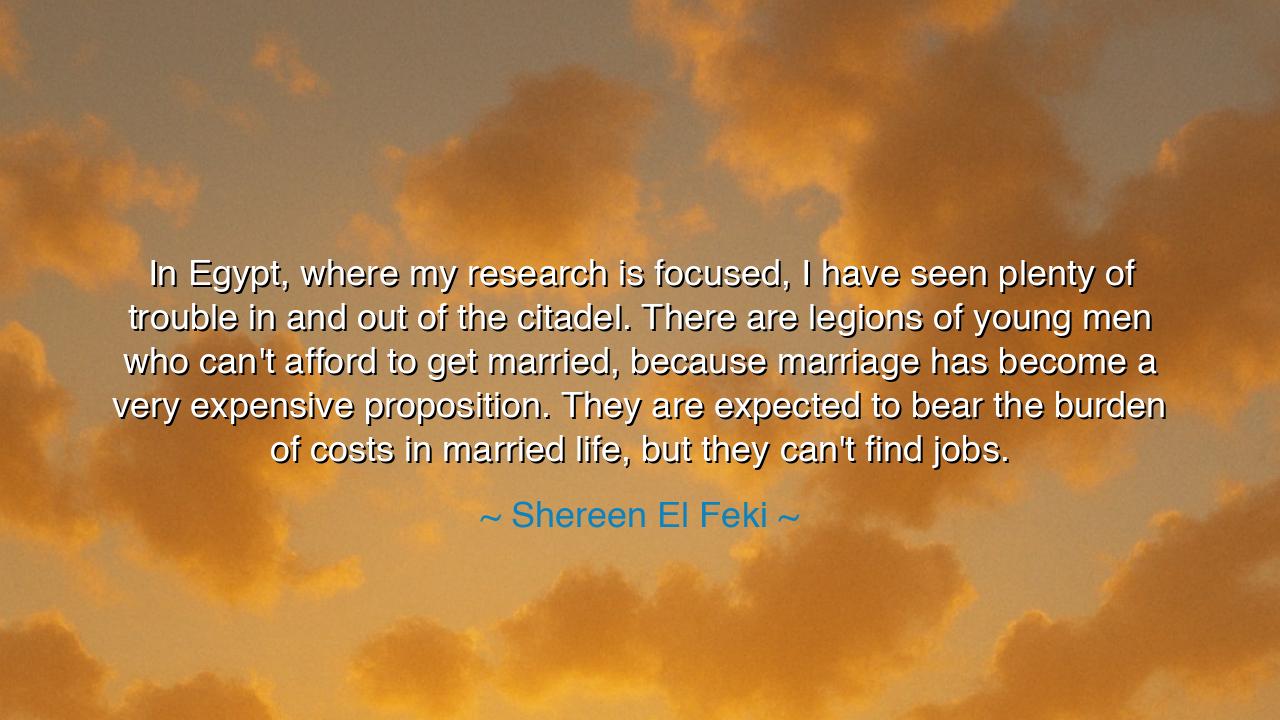
In Egypt, where my research is focused, I have seen plenty of
In Egypt, where my research is focused, I have seen plenty of trouble in and out of the citadel. There are legions of young men who can't afford to get married, because marriage has become a very expensive proposition. They are expected to bear the burden of costs in married life, but they can't find jobs.






Gather close, O children of the earth, and listen to the words of Shereen El Feki, a voice of deep understanding and insight. She speaks of a struggle that many do not see, yet one that shapes the lives of countless individuals. She says: "In Egypt, where my research is focused, I have seen plenty of trouble in and out of the citadel. There are legions of young men who can't afford to get married, because marriage has become a very expensive proposition. They are expected to bear the burden of costs in married life, but they can't find jobs." In these words, she paints a vivid picture of the trials faced by the youth of Egypt, trapped between the sacred desire for commitment and the harsh realities of an economy that cannot support them.
Ah, how familiar this struggle is, O children. From the earliest days of human society, marriage has been a sacred bond, a promise of love and unity, a union that not only joins two hearts but two lives. Yet, in the course of time, marriage has come to symbolize not just a union of souls, but a union of resources. It is no longer a simple matter of love, but of the ability to provide, to bear the burdens of costs, to ensure that the union can thrive. And yet, as El Feki points out, in Egypt, as in many lands, the burden of marriage has become insurmountable for many young men, who find themselves unable to secure the means necessary to fulfill this ancient obligation.
Consider the ancient tale of Hercules, that mighty hero who faced many trials, not all of which were of his choosing. One of his greatest challenges was to prove his worth and his ability to provide for the labors laid before him, tasks that seemed beyond human ability. He was tasked not only with great feats of strength but with the immense responsibility of meeting the expectations of others. So too, in the world of marriage today, young men are burdened with the great weight of expectation, where the costs of a wedding and the responsibilities that come with it often seem to require feats beyond their reach. Yet, unlike Hercules, they are not always afforded the opportunity to rise to the challenge, for they are often denied the resources they need to succeed.
Shereen El Feki’s words reflect a growing crisis not only in Egypt, but in many parts of the world—where marriage has become a financial transaction, a duty weighed down by costs and societal expectations. The young men in Egypt are trapped in a cycle where jobs are scarce, and the prospects of securing the means to support a family seem hopeless. Marriage, which should be a celebration of love, has become a source of anxiety, a marker of failure for those who cannot meet the financial expectations of society. This is not merely an issue of economics, but of hope, as young men find themselves unable to fulfill the natural desires of their hearts due to forces beyond their control.
Consider the struggles faced by Rome as it moved from the Republic to the Empire. The societal changes of that time were vast, and the youth of Rome were similarly burdened by expectations of duty, including marriage and the ability to provide for their families. Yet, as the empire grew, so too did the inequality—those who could not meet the burdens of citizenship were often cast aside, left to struggle without the means to marry or live with dignity. It was in these times of societal strain that the idea of the moral and economic responsibilities of marriage became a defining feature of Roman life. The difference between success and failure lay in the ability to provide, to support, and to meet the demands of family. This ancient struggle is echoed in the words of El Feki, whose work reminds us that economic inequality remains one of the primary challenges of modern life.
The lesson, O children, is clear: marriage is not just a matter of love, but a matter of resources and responsibility. When the economic system fails to provide the means for individuals to fulfill their basic duties—whether to themselves, their families, or their society—the fabric of society itself begins to unravel. El Feki reminds us that true progress cannot occur until we ensure that the young—both men and women—have the means to live, to love, and to contribute without the crushing weight of economic strain. A society that demands marriage and family as markers of success must also provide the means for its people to meet those demands with dignity and hope.
In your own life, O children, take this wisdom and act upon it. If you are to build a future where all are free to love and to marry, where all can contribute to the world without fear of poverty, you must work toward justice in the economic structures that bind us. Support the youth, advocate for job creation, and push for policies that allow all individuals, regardless of their background, to live with dignity and freedom. For only when we remove the burdens of inequality will the path be clear for all to walk in the light of love, commitment, and a future where marriage is a choice made from the heart, not a struggle against the forces of society.






AAdministratorAdministrator
Welcome, honored guests. Please leave a comment, we will respond soon